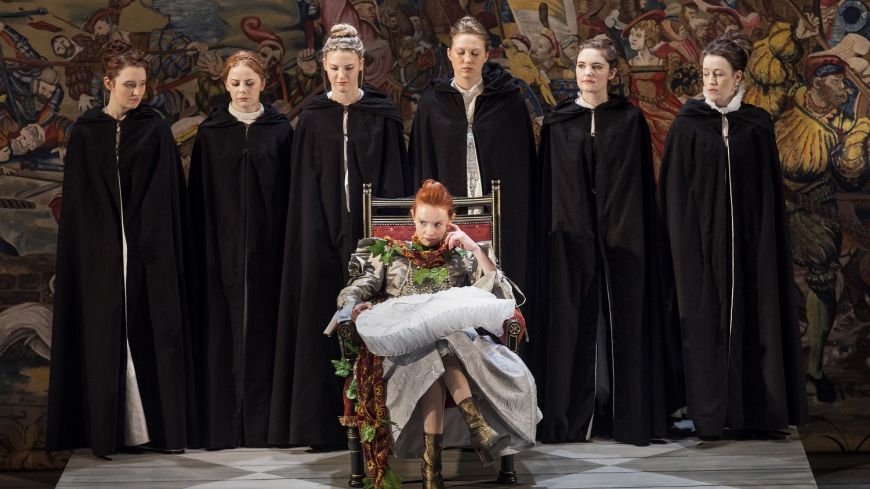
A stage almost as bare as a post-reformation kirk greets the audience for ‘Glory on Earth’, while a version of Charles Trenet’s ‘La Mer’, returned to popular consciousness by the film version of ‘Tinker, Tailor, Soldier, Spy’, plays in the background, a riff on the themes of conviction, betrayal and the lengths people may be prepared to go to in order to preserve their own sets of values.
Linda McLean offers an early dramatic statement that suggests we are not about to see a re-interpretation of another playwright’s view of Mary, Queen of Scots, but the figures of the Queen and her determined critic, John Knox, present a mutually aggressive pas de deux that dominates the action.
Given the complexities of Scottish, English and European history at that time, this is possibly wise, although as with any such presentation, what is missing may be as significant as what we are given.
Rona Morison’s thrawn Queen is ably supported by Christina Gordon, Christie Gowans, Kirsty Eila McIntyre, Hannah Jarrett-Scott, Shannon Swan and Fiona Wood as the Queen’s ladies-in-waiting, the Scots nobility and various reformers. Collectively they form a chorus, but their individual performances offer considerably more than this.
Jamie Sives opportunities as John Knox are rather more limited than Knox’s own account and the little else we know of him. ‘Glory on Earth’ offers us verbal combat based on opposing views of this world and the next, ultimately irreconcilable to one another, which makes for some fine theatrical moments but not necessarily a good play.
What’s lacking, despite McLean’s best efforts, is the outside world. As she admits herself, our principal source for encounters between the Queen and Knox is the latter’s “History of the Reformation in Scotland” in which he unsurprisingly figures more largely than he did in life. McLean’s focus on these both limit Knox, who could not only tenderly mourn his first wife but also agonise over the chastisement of his son and maintain a deep friendship with his mother-in-law. Somehow both he and Mary remain rather less than human cyphers.
Although McLean’s script is unarguably feminist, her arguments fail to wrestle down male fears of feminine power and its capacity to overturn male order. Knox’s protest against the female rulers of his day remains a howl of literal impotence, yet there’s little echo of it here.
Despite the play’s six other Marys, what’s also missing is a reflection of Mary Stewart’s people, or indeed the multitudes who lived as best they might in a troubled time, during which civil war in France, the Netherlands and parts of Germany threatened to engulf all Europe in conflict. Mary’s misfortune was to be found quite as much in continental Europe and the court of her cousin Elizabeth where financial feeding frenzy on the part of some of her courtiers and the exceptionalist ambitions of her ministers were destabilising rule in other parts of these islands.
McLean understandably elides over the latter part of Mary’s reign, owing presumably to the demands of necessary exposition, yet even what we are presented with, try as it does to suggest something of both the contemporary and eternal issues at stake in the arguments put forward by both principal protagonists ultimately fails to fully satisfy.

